Self-adhesive mosaic in wall decoration

Today, bathrooms and kitchens are the easiest places to get creative and implement unusual design ideas. This is because you are absolutely not limited in the choice of textures, materials and styles. There are a lot of simple and stylish solutions for the bathroom and kitchen. Another positive point is that you can choose from different color arrangements and are not limited in your fantasies, which cannot be said about other rooms. After all, bedrooms, as a rule, are performed in calm color tones, children's rooms are made bright and light. And the decoration of the bathroom, toilet and kitchen is done based on the preferences of the owners or the imagination of the designer.
Peculiarities
It is worth noting that the positive qualities of ordinary mosaics are practically the same as those of self-adhesive mosaics. However, there are some important differences between these finishes for damp rooms. In particular, this is an opportunity to independently carry out work on the installation of mosaic tiles.
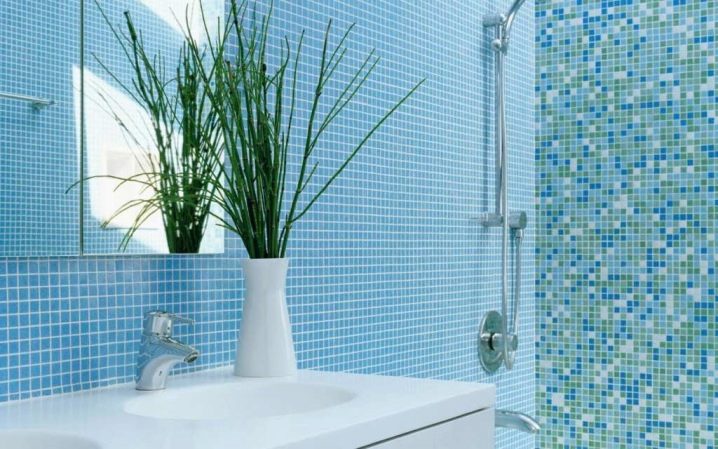
Mosaic advantages:
- ease of installation;
- a large number of colors;
- variety of design options for decorative elements;
- the ability to perform work independently, which entails lower costs for interior decoration;
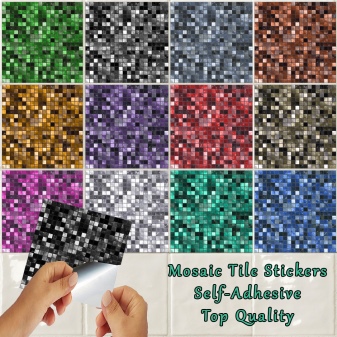

- no need to purchase expensive auxiliary materials, equipment and tools;
- ease of use;
- mosaic compositions are perfectly combined with other materials in interior design;
- high level of environmental friendliness.

In the most common version, "self-adhesive" is produced and supplied as individual tiles., which are similar in size to ceramic tiles or slightly differ in size. The thickness of such tiles is about five millimeters and is a two-layer structure. The first outer layer is a polymer coating with a certain texture, and the second is a self-adhesive very thin backing. To attach the mosaic to the surface you need, you need to follow a simple procedure.

In the beginning, it is worth choosing a flat surface of the wall, floor or ceiling. Then the protective layer is removed from the self-adhesive part of the board, which is pressed against the selected plane. After the plate is fixed on the plane, you need to remove the protective layer from the polymer part, which will need to be wiped with a damp cloth or paper. The self-adhesive backing has a very high adhesion force, which means that it will be very difficult to detach the glued mosaic from the wall.



There are several fairly important rules that should be followed when finishing work. First, the gluing must be done very carefully and the correct arrangement of the mosaic tiles must be chosen. But it is quite possible to finish the required surfaces without the help of professionals, since this does not require the use of specialized grouting. The grout is wonderfully replaced by the background, which is created by a self-adhesive surface. However, the use of grouts of various colors is not prohibited and is quite acceptable.

For kitchen
If you have a desire to use this technology to create a beautiful interior for your kitchen, it is worth considering compliance with several important factors when choosing a finishing material for the kitchen:
- sharp temperature drops and high levels of humidity;
- the possibility of wet cleaning using chemicals;
- the relevance of the decor.






Most of the above criteria are met by wall mosaic decoration, and in some cases ceiling and floor decoration. The mirror adhesive coating is unique for its excellent compatibility with almost any decorative finish. The coating, which is intended for the interior decoration of the kitchen, is made of heat-resistant and moisture-proof materials. A huge range of shades and colors will allow the owner or designer to choose the best option for the interior, which will be combined with the rest of the room.
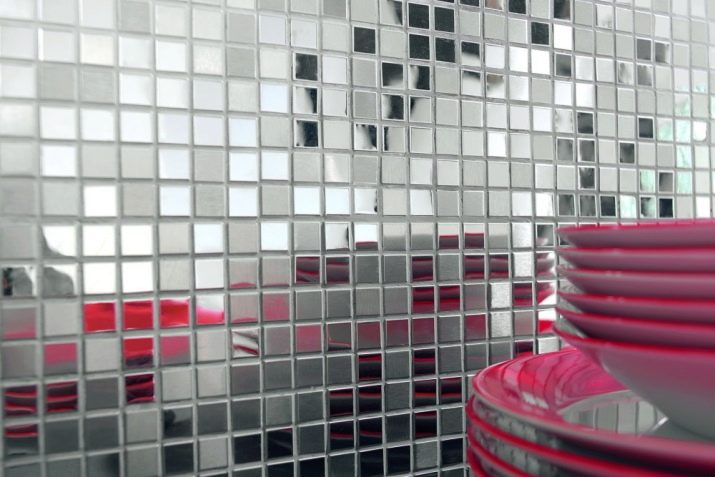





Views
The main classification is due to:
- material of manufacture;
- the method of laying on the work surface;
- dimensional range and shape of the material.


Today on the market there is a huge assortment of mosaics made of glass, stone, plastic, metal, ceramics and wood. True, wood is not used in the kitchen and bathroom, as it is poorly protected from the effects of water. There are a lot of options for the execution of mosaic elements in terms of geometry, ranging from the most common shape "square" and ending with a triangular or oval type of "shell". It is very important to take into account the color, size and shape of the mosaic parts when planning a panel with a given pattern or ornament.

Sequence of work during installation
Individual chips and mosaic tiles are stacked on a combined mesh base and do not require a perfectly flat surface, and curved parts of the surface can help create unusual shapes in the interior. But since the vypvev mosaic is on a self-adhesive base, it is required to more carefully align the work surface. All this is necessary so that in the future there is no peeling of some parts and changes in the original form of the finishing material.

This will take some tool and a little patience. The necessary tools are usually available from any owner. The degree of complexity of the work directly depends on the initial state of the working surface. Previously, tiles were often used to decorate the “apron” in kitchens. It is worth noting that in the arsenal of modern manufacturers there are tile modifications that imitate a mosaic coating. They are often lower in price than self-adhesive mosaics, but such a coating looks less presentable.
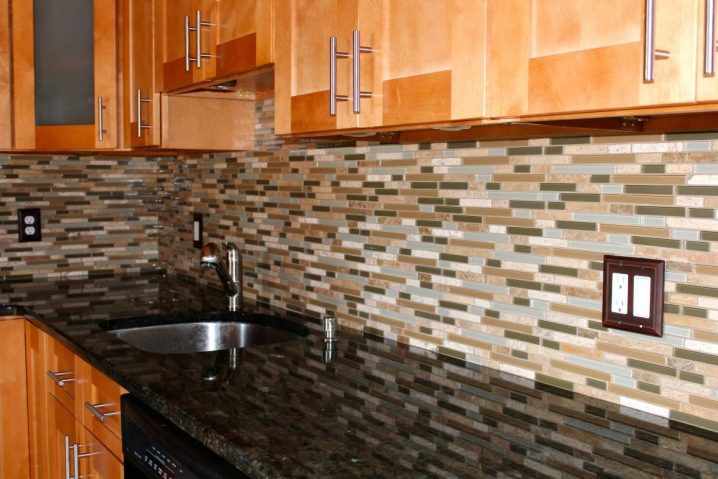
First, it is worth dismantling old ceramics, wallpaper or paint. together with the remains of solidified fastening materials. Of course, difficulties can arise when processing surfaces decorated with oil paints or enamel. To cope with this process, you can make special notches with a perforator or a hammer with a chisel, which should raise the layer of plaster and be located at a small distance from each other.

The work surface should then be treated with a deep penetrating acrylic or latex primer. When the primer is dry, a leveling layer of plaster should be applied to the wall or ceiling plane. For this purpose, gypsum plaster is perfect. It is quite flexible, has a high level of adhesion and does not require additional filler, and most importantly, it is sold at reasonable prices.

To continue working, you must wait until the mixture is completely dry. This process can take from one to two days, it all depends on the thickness of the applied material. Then the prepared surface is sanded with a special mesh or fine sandpaper. Next, a layer of finishing primer is applied, which finally prepares the surface for further finishing. It adheres the molecules of the substance to each other on the surface and improves the adhesion of the wall surface to the self-adhesive tiles. And, of course, it is necessary to let the primer dry properly so that it fully fulfills all its functions and declared characteristics.

All of the above operations, with a certain degree of diligence and diligence, can be performed independently. The time spent is more than offset by the cost of hired labor. If you are not confident in your abilities, then it is better to seek help from specialists.
The main work on gluing the mosaic begins with the application of markings to the previously prepared surface. Before installing the mosaic, you need to make sure that the markings are correct and that they meet the technical requirements. The first row of mosaic tiles is glued according to the markings made. To get around the ridges that create the inner and outer corners, simply cut the base of the element. A clerical knife is perfect for this procedure.

The self-adhesive backing of the decorative mosaic is covered with a special protective film, which must be removed immediately before installation. The installation of the elements on the wall must be accurate and verified. Once fixed to the surface, the mosaic element will not be able to be corrected without damaging the segments. It is not necessary to grind the seams between the elements. The base, made in white or black, creates the necessary color contrast and looks quite aesthetically pleasing.
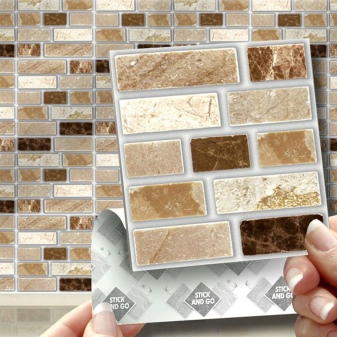

How to choose?
One of the most important criteria for choosing a particular material is its price.
It is worth highlighting a number of factors that affect the pricing of the mosaic:
- the country in which this material is produced;
- brand popularity;
- the degree of complexity of the decor;
- material of manufacture;
- the number of elements used.

It should be understood that a product made from natural material will have a higher price than the same product, but made of artificial material. The desire of people to buy most of the imported goods, which are an order of magnitude higher in price, in contrast to domestic or Chinese products, also strongly affects the price. The products of world famous brands are the most expensive.

Care
It is difficult to find a more suitable type of finish that is as easy to use as a self-adhesive mosaic. It well hides dirt in the form of splashes of grease, oil, juice and soap suds, it can also be easily washed with liquid detergents and retains an excellent look for a long time. And if it happens that one of the elements is damaged, then it is possible to replace it without violating the integrity of the entire composition. This will significantly save money on repairs and time. But in order for the purchase of an identical coating not to cause difficulties, when purchasing materials for repairs, you should purchase a mosaic with a margin of 10-15%. This step will be appreciated in the event of a forced replacement of elements.

You can watch a master class on the installation of a self-adhesive mosaic on the wall in this video.













The comment was sent successfully.